The ARC Research Hub for Driving Farming Productivity and Disease Prevention is funded through a prestigious and highly competitive Australian Research Council Industrial Transformation Research Hub Grant and focuses on driving industrial transformation in the agricultural sector. It has successfully fostered outstanding industry-research collaborations with five industry partners (Australian Bay Lobster Producers, Davco Agriculture, Sunray Strawberries, Aquarius Technologies and NextVPU), six Universities (Griffith University, The University of Adelaide, The University of Sydney, The University of Western Australia, Deakin University and Monash University) and the Commonwealth Scientific and Industrial Research Organisation (CSIRO). Through strong industry engagement and world-leading capabilities in image processing, machine learning, robotics, and software, together with expertise in engineering, agronomy, biology, water use, and farming technology, the Hub has already achieved significant success by advancing and incorporating new artificial intelligence (AI) technologies into industrial deployment in both testing and production environments including on-farm AI-based quality control. Adopted innovations have improved efficiency and revolutionized the way business is carried out, promoting higher farming efficiencies and lower production and disease costs. The Hub’s work is of high impact and has proven potential to benefit food production and distribution on a global scale.

CATEGORY WINNER
Impactful Research Team of the Year Award
ARC Research Hub for Driving Farming Productivity and Disease Prevention
CATEGORY WINNER Impactful Research Team of the Year Award
Griffith University - Australia
"Driving agricultural efficiency and sustainability with AI technology"
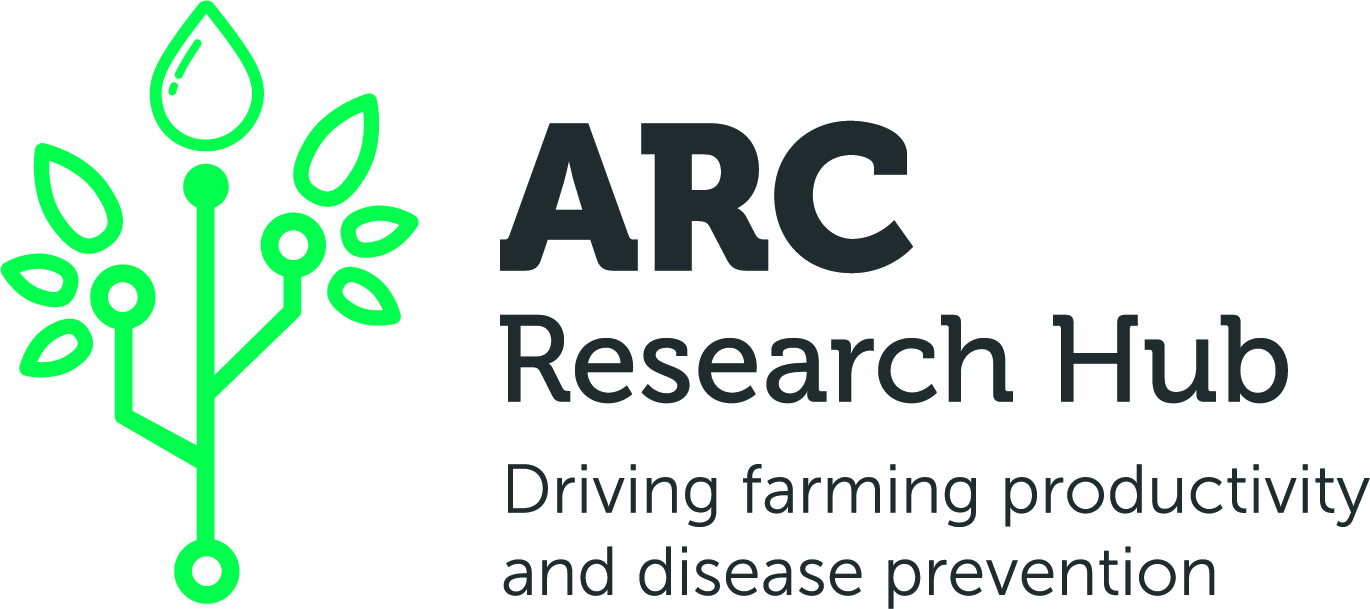
Summary
Key People

Professor Yongsheng Gao
Director
ARC Research Hub for Driving Farming Productivity and Disease Prevention ,
Griffith University

Professor John Grundy
Laureate Fellow and Professor of Software Engineering
Department of Software Systems & Cybersecurity, Monash Data Futures Institute ,
Monash University

Professor Jun Zhou
Director
Institute for Integrated and Intelligent Systems ,
Griffith University

Associate Professor Andrew Busch
Head of School
School of Engineering and Built Environment ,
Griffith University

Winthrop Professor Mohammed Bennamoun
Winthrop Professor
School of Physics, Maths and Computing,
University of Western Australia

Professor Ajmal Mian
Professor
School of Physics, Maths and Computing ,
University of Western Australia

Professor Simon Lucey
Director
Australian Institute for Machine Learning (AIML) ,
University of Adelaide
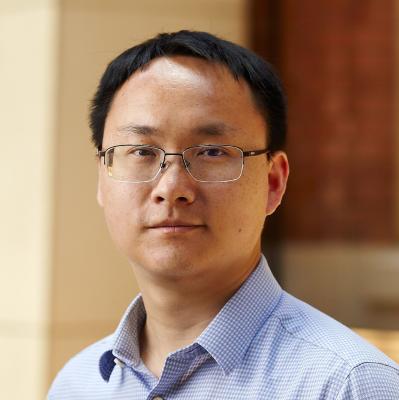
Dr Lingqiao Liu
Senior Lecturer
Australian Institute for Machine Learning (AIML) ,
University of Adelaide

Professor Rebecca Ford
Dean
Griffith Graduate Research School ,
Griffith University

Professor Rosanne Guijt
Professor of Smart Sensors
Faculty of Science, Engineering and Built Environment, Centre for Regional and Rural Futures (CeRRF) ,
Deakin University

Professor Qin Li
Professor of Environmental Engineering
School of Engineering and Built Environment ,
Griffith University

Professor Jin-Song Dong
Professor
Institute for Integrated and Intelligent Systems ,
Griffith University

Professor Dacheng Tao
ARC Laureate Fellow and Professor of Computer Science
School of Computer Science,
University of Sydney

Dr Changming Sun
Research Scientist
Data61,
Commonwealth Scientific and Industrial Research Organisation (CSIRO)

Professor Nam-Trung Nguyen
Director
Queensland Micro and Nanotechnology Centre ,
Griffith University

Michael Dalton
Managing Director
Australian Bay Lobster Producers

David Cox
Owner
Davco Agriculture

Sergio Koulakov
General Manager
Aquarius Technologies

Ray Daniels
Director
Sunray Strawberries

Ji Zhou
Chief Technology Officer
NextVPU
Acknowledgements
We wish to acknowledge and thank the Australian Research Council for granting $AUD 5million towards the Hub project and for its ongoing support.
Thanks to our industry partners for financial contributions and collaborations:
Aquarius Technologies Pty Ltd
Australian Bay Lobster Producers Ltd (ABLP)
Davco Agriculture
Next VPU (Shanghai)
Sunray Strawberries
Thanks to our collaborative research partner organisations:
The University of Adelaide
The University of Sydney
Deakin University
Monash University
The University of Western Australia
Commonwealth Scientific and Industrial Research Organisation (CSIRO)
Images
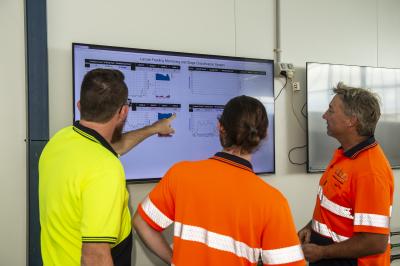
ABLP Lobster Monitoring System
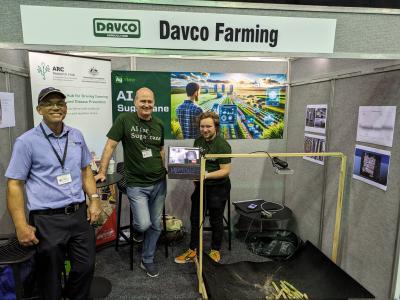
Davco Farming Booth at ASSCT
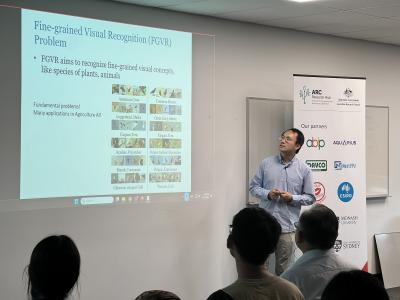
Dr Lingqiao Liu presenting at 3rd Smart Agriculture Symposium
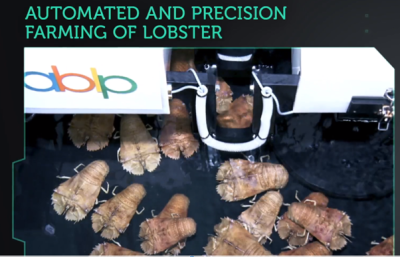
ABLP Lobster Raceway
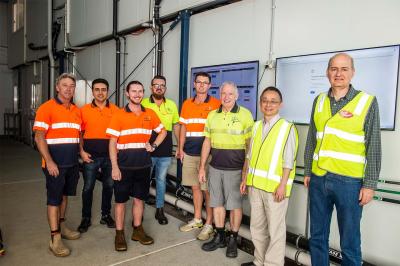
Australian Bay Lobster Producers Team

ARC Research Hub Director, Prof. Yongsheng Gao, presenting at official Hub launch
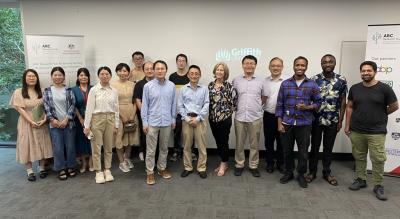
Hub Team at 3rd Smart Agriculture Symposium
IMPACT STORY
Impacting lifes
ARC Research Hub industry partner, Australian Bay Lobster Producers (ABLP), is a grower and supplier of premium-quality Bay Lobsters, also known as Moreten Bay bug. A key concern for ABLP is the productivity bottleneck resulting from the need for continuous monitoring of lobster larvae. The monitoring of lobster larvae is essential for production management, animal health and timely decision making in a commercial aquaculture environment. Traditional monitoring methods that rely solely on human observation, are both time consuming, costly and are not highly accurate.
Combining University based researchers expertise in the fields of computer vision and machine learning and ABLP’s expertise in farming and cultivating lobster products, an automated 24/7 monitoring system has been developed and deployed into ABLP’s commercial production environment. The monitoring system allows for the scanning of lobster larvae and tracks animal numbers, size and feeding habits. This allows for precision feeding, optimising the growth rate of the larvae and significantly reducing mortality and impact on water quality while also reducing labour costs for this critical stage of lobster development. This technology has proved to be extremely effective in significantly improving larval stage output and is currently being scaled up to be replicated across the whole larval environment.
By incorporating artificial intelligence technology such as machine learning and computer vision, the Hub team have automated ABLP’s production process, improving efficiency and providing positive benefit in the short term and laying the foundation for significant operational benefit in the future.
LEARNINGS
Lessons learnedWith the decline of federal funding for research and development in Australia, research funding will become increasingly tied to industry funding. It is therefore important for researchers to have an understanding of industry needs and wants. Ultimately, the industry needs solutions to a problem, however, every industry partner is unique with differing needs. You should define and develop in depth knowledge of relevant industry sectors and deepen your understanding of local, regional and national priorities and how your research aligns with these. If possible, have a physical presence in the industry partner’s camp. Majority of the Hub Research Fellows are placed in industry partner organisations and work closely with them on a daily basis, which facilitates a consistent integration of academic research and practical industry applications. Moreover, it fosters strong collaborations between academia and industry, driving innovation and ensuring that the research outcomes are directly relevant and beneficial to industry.
FUTURE PLANS
What's coming?
With lots of work still to be done, the Hub team are exploring future funding opportunities and the translation and commercialisation of the technology that has been developed out of the ARC Research Hub. Through Ag2030, the Australian Government is setting the foundations for the Australian agricultural sector to grow to $100 billion by 2030, however, the Australian agrifood sector is currently facing several significant challenges. These include the impacts of climate change and severe weather events on agricultural production, disease control, a shortage of skilled workers in the industry, and shifting consumer preferences for food.
Addressing these challenges requires significant and coordinated investment in research and development. This investment must facilitate collaboration between industry, government and research organisations. To meet this need, with the support of Griffith University, the ARC Research Hub for Driving Farming Productivity and Disease Prevention are currently working on a Cooperative Research Centre Project (CRC-P) bid in partnership with Australian Bay Lobster Producers. CRC-P grants fund short-term, industry-led research collaborations and the projects must develop a product, service, or process that solves industry problems, benefits small-to-medium enterprises and includes education and training activities.
The CRC-P bid will build on the expertise and strengths of Hub researchers and Hub industry partner, Australian Bay Lobster Producers. The next stage will see further scale-up and adoption of Hub-developed technology for smart innovation in land-based aquaculture.

